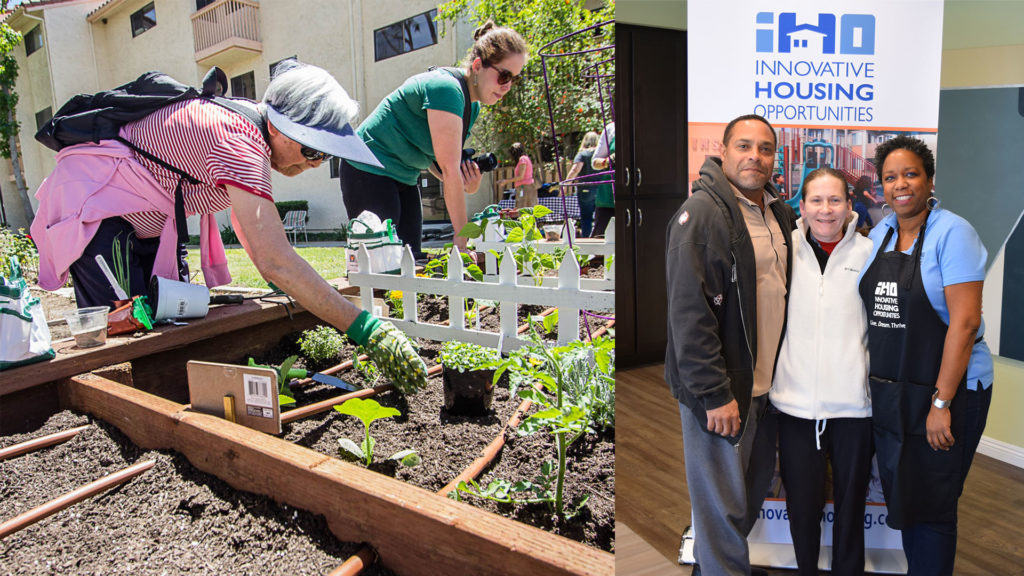As a proponent of upward mobility and economic independence, Innovative Housing Opportunities (IHO), an Orange County-based accessible housing development nonprofit, works to build supportive communities for those in need. In the face of the pandemic, President and Chief Executive Officer Rochelle Mills explains how IHO committed to improving their team dynamic and expanding their reach. IHO’s participation in ESC’s Executive Directors Leadership Institute (EDLI) and Developing Development Program (DDP) has resulted in renewed, organizational energy and confidence to excel in providing high-quality accessible housing and support economically vibrant communities.
According to Mills, last year turned out to be a year of growth and success, exceeding IHO’s own predictions. She describes IHO’s transformation as a journey where “for the first 35 years we had training wheels, for the last 10 years we’ve had somebody running alongside holding the bike and we are finally pedaling on our own.”
By building mixed-income, multigenerational, mixed-ability housing and providing programming that promotes education, wellness, and community, IHO seeks to create diverse communities that serve housing-vulnerable populations with the long-term goal of economic independence for their residents.
Mills joined IHO as a part-time project manager and by the time she stepped into her role as CEO in 2018, she had seen the organization through expansion and evolution in Southern California. She sought out ESC services to help her adapt to her new leadership position and further her professional development.
While Mills was eager to join the EDLI 2020 cohort, when the pandemic set in—concurrent to a period when IHO was having staffing changes—she hesitated whether it was the right time to participate. As a developer involved in coordinating social and case management services, the organization faced multiple COVID-related challenges on all fronts. EDLI’s training topics, peer support system and coaching approach cemented Mills’ belief that the program would be a worthy investment.
“Everything that was coming up was for the first time. The first time you’re watching something external ripple through every facet of the work that we do, from the real estate development and the cost of the services to delivering those services remotely when touch and connection are so critical. It was something that I could not have done on my own. It was just amazing to be able to have this cadre of professionals.”
In fact, the impact of EDLI far exceeded her expectations. Not only did Mills personally benefit from the program, but the impact trickled up and down throughout the organization. Mills recalls that immediately after EDLI, she decided to formalize the IHO team’s collaborative environment. She formally created executive, leadership, and staff teams to clarify expectations and provide opportunities for mentorship, career growth within IHO, and channels for board members to interact with staff.
Mills also had the staff team work together to write their core values, creating guiding principles and a lens through which to intentionally filter through new projects, approve board members, or hire staff. These steps boosted confidence within the organization and its mission, leading to tangible growth.
Riding on the momentum generated from EDLI, IHO then applied for ESC’s DDP with the full support of their board. While EDLI boosted the organization’s confidence, DDP advanced IHO’s self-reliance. Participating in DDP pushed Mills and the IHO team to answer the fundamental question, “Why give to IHO?” During their fund development discussions and planning, they realized they would have to reframe how they communicated their mission to donors and others outside of the organization. Inspired by DDP’s trainings, the IHO team created their own collateral materials to answer “Why IHO?”
“One of the things we are looking at through DDP is as an organization to be self-reliant. That’s sustainability.”
As a result, the team was able to meet several Year Three fundraising goals in their first year and publish a “6 Differentiators” brochure for their board and staff, outlining how individuals can make an impact by giving to IHO and what makes IHO unique in addressing accessible housing. DDP provided their team the opportunity to gain a different perspective on development and outreach, helping them recognize that together they are “giving people an opportunity to have a catalytic impact they want to have on society.”
With the experience of EDLI and DDP, Mills knows IHO can be a nonprofit that builds the prototype to reinvent the housing development delivery system. Their distinctive approach to mixed housing, supplemental services, and commitment to their residents’ upward mobility can help create models for diverse, thriving communities we all want to live in and envision for our future.

